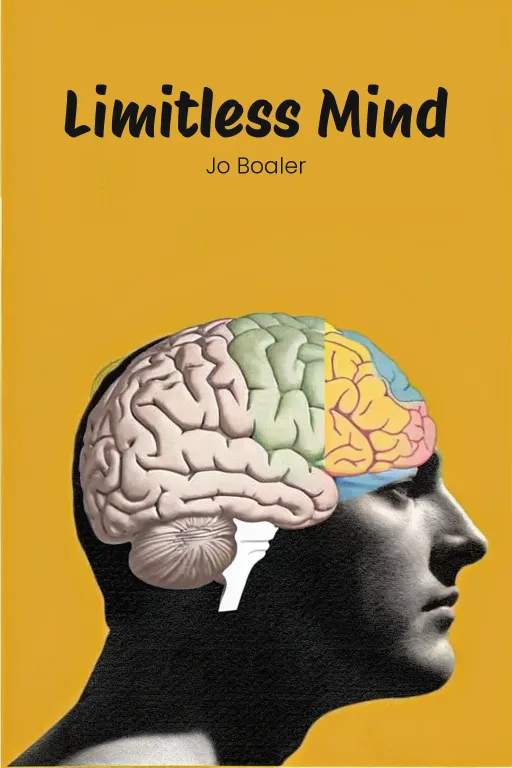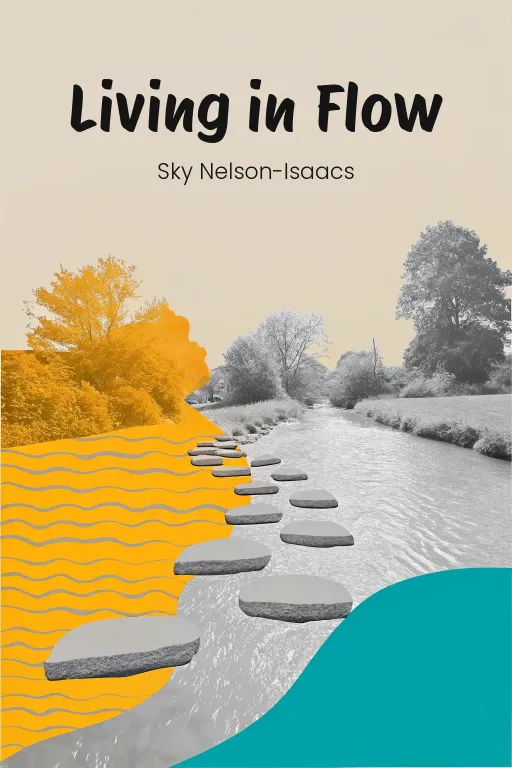
Design Your Life: Be the CEO
Podcast by Beta You with Alex and Michelle
Ignite Your Power, Your Purpose, and Your Why
Design Your Life: Be the CEO
Part 1
Alex: Hey everyone, welcome back to the podcast! Today, we're diving into “You Owe You” by Eric Thomas. This book isn't just about motivation; it’s really a practical guide to taking control and living with real purpose. Michelle: "Taking control," huh? It sounds great, but seriously, how many people actually pause to think if they're truly steering their lives, or just sort of going with the flow? Alex: That's exactly what Thomas addresses. He pushes us to stop drifting and start leading, like the CEO of our own lives. He shares his own story—dropping out of high school, experiencing homelessness, and then becoming a top motivational speaker—showing anyone can overcome anything. Michelle: Okay, so he’s saying transforming your life isn't just for some lucky few. But... where do you even begin? Alex: That's the brilliance of the book – Thomas breaks it down step by step. Today, we’re going to unpack three key takeaways that can be real game-changers. First, we will talk about taking ownership of your life and acting as the CEO. Then, we’ll explore identifying your unique superpower, what makes you stand out, and how to use that to fuel your purpose. And lastly, we'll tackle the tough one: leaving behind what's merely "good" to chase "greatness." Michelle: Sounds like serious work! So, we’re talking about shifting mindsets, discovering our strengths, and making bold moves? Basically, creating a roadmap for who we're truly meant to be? Alex: Precisely! It’s about deliberately designing your future. Honestly, this book has a lot to unpack, but the lessons are practical, empowering, and can seriously change your life.
Self-Awareness and Ownership
Part 2
Alex: So, picking up where we left off, let's delve into “self-awareness and ownership” It's really the cornerstone of everything Thomas explores in “You Owe You” He's hammering home the point that transformation starts when we stop pointing fingers and take responsibility for where we are. Michelle: Okay, that's a tough one right off the bat I mean, it's not exactly a walk in the park to admit that your current situation—good, bad, or just plain meh—might be the result of “your” choices People are masters at the blame game, right? The boss, the system, the economy, even Mercury in retrograde gets the blame! So, what's Thomas's angle here? Alex: Well, his angle is radical honesty He explains that self-awareness begins with fully owning the fact that “you're in the driver's seat.” Sure, external things influence you, of course, but focusing on what you can't control gets you nowhere One of his most powerful examples comes from his own life As a teen, he experienced homelessness—a situation that's easy to blame on circumstances But instead of getting stuck there, he really looked at how “his” choices led him there. Michelle: Wait a minute Is this like a tough love situation? Is he basically saying, "Get over it, take a hard look at your mistakes, and fix them"? Alex: Well, yes and no It's not just "tough love," it's tough “accountability” Thomas isn't downplaying real challenges, he’s been there himself, but he’s saying you can't let victimhood define you In his case, he recognized that skipping school and avoiding responsibility had real consequences Accepting that was a turning point It’s not about self-blame, it's about self-empowerment When you take responsibility, you go from passively watching your life to actively shaping it. Michelle: Okay, I get that So, rather than waiting for life to magically improve, you say, "This is on me." But isn’t that kind of overwhelming? Where do you even begin with that? Alex: Ah, that's where his CEO metaphor comes in—honestly, it's one of the best parts of the book He says to think of your life like a business you're running You don't just react to the market; you create a vision, define goals, and then track your progress He suggests starting small—like, reflect each day on whether your actions match your goals It’s all about “intentionality.” Michelle: Alright, hold on Visualizing yourself as the CEO of your life is cool and all, but CEOs usually have a team backing them up So how do the rest of us, the, I don't know, "solo founders," make this work without a full support staff? Alex: It's funny you mention that, because Thomas also talks about the importance of mentors and community He stresses that accountability isn’t something you can always do alone He believes that having mentors or even peers who push you to be better is super important It's like having a board of directors—people who hold you accountable and help you stay on track with your mission. Michelle: Interesting So, accountability is not just about self-discipline but also about relying on others to keep you honest Do you remember that story about the student working on his GED? That one really stuck with me. Alex: Definitely Thomas talks about working with high school dropouts who had all kinds of excuses why success was impossible One young man, in particular, was stuck in this mentality, blaming his family and his upbringing Thomas challenged him to quit outsourcing his failures and recognize his agency When the student finally took ownership, it was like a switch flipped He went on to get his GED, enroll in college, and completely change his life. Michelle: That’s huge And it really shows how powerful that shift in internal narrative can be, changing from "I can't because…" to "I will." But what about the skeptics? You know, the ones who say, "Sure, Eric Thomas can preach this because he “made it”—but for the rest of us, life just doesn't fall into place.” Alex: Well, that's why Thomas doesn't sugarcoat it Ownership doesn't mean life suddenly becomes easy It means you make conscious, deliberate choices to move forward despite the obstacles He talks about this tug-of-war between external pressures—like societal norms or peer pressure—and staying true to your goals That, he says, is what separates drifting through life from designing a life with intention. Michelle: Let's pause there for a second External pressures can be intense, right? Social media alone can make you feel like the entire world has an opinion on how you ought to live How does he suggest tuning all of that out? Alex: It all boils down to resilience Thomas suggests grounding yourself in practices like affirmations and visualizations to really stay connected to your personal vision He even credits gratitude—actively focusing on what’s going right—as a way to balance out the constant negativity we all face Basically, he’s teaching readers to build a mindset that’s strong enough to block out the noise, so your inner world remains centered. Michelle: He really emphasizes intentional habits, doesn't he? Like setting daily goals or asking yourself those tough questions, like "Does this decision bring me closer to my purpose?" I can see how that sort of thing could shift your priorities over time. Alex: Exactly And small habits build momentum He shares a powerful story from his early speaking career when he had to face his own fears Going from being unknown to public speaking wasn't easy – it terrified him! – but he realized the discomfort of staying "safe" was holding him back Thinking of fear as temporary gave him the push to start, and that one decision snowballed into everything we see from him now. Michelle: So, it’s about embracing the fear, owning the discomfort, and letting it fuel your growth Makes sense—though it’s definitely easier said than done!
Discovering and Channeling Your Purpose
Part 3
Alex: Once you really understand how powerful self-awareness is, the next step is using your unique strengths to move towards what you want to achieve. Which leads us to today's topic: finding and using your purpose. This idea builds on self-awareness by helping people turn their self-knowledge into real actions, connecting what they can do with what they actually do. Michelle: Okay, “discovering purpose.” Sounds like a big deal. Let me guess, step one is figuring out your “why,” right? It's a popular phrase that a lot of people like to use, but no one explains how to actually discover it. Alex: Exactly, Michelle. Eric Thomas focuses on this whole idea of identifying your “why.” He describes it as what truly motivates you – what makes you excited to wake up, not because you have to, but because you want to. And he emphasizes that finding it takes real effort. It's not going to just appear one day; it requires thinking deeply, putting in effort, and often taking some messy, imperfect steps. Michelle: Thinking deeply and messy steps—so, finding your purpose isn’t some kind of magical moment we saw in the movie? Though, let’s be honest, people might just think they don't have a purpose if they don’t discover it immediately. Alex: Definitely! Thomas talks about that directly. He explains that for many people, purpose appears bit by bit over time. Think about his story—his "why" wasn't a sudden revelation; it was something he discovered by being involved in his community. Speaking at Detroit Center, inspiring people through sermons, made him feel grounded. It wasn't simply about enjoying public speaking – it was about building connections with others, helping them make a change. That strong emotional connection? That's how he recognized it was his purpose. Michelle: So, purpose has two part—first, understanding what you’re good at, and then connecting it with something you believe is meaningful and worthwhile. Like a skill that becomes meaningful because it benefits more than just yourself. Alex: Exactly. And his surroundings were really crucial in this discovery. Detroit Center gave him a place to experiment, to try things out, to fail, and eventually to develop confidence in his own voice. He even mentions that if he hadn't been in an environment where people appreciated what he offered, he might never have felt encouraged to continue pursuing it. Michelle: The environment is often overlooked in these discussions. We always talk about talent and passion but not often about how the right community or setting can bring those things out. It’s kind of like the soil for the seed to grow. Without it, your gift can stay hidden. Alex: That’s a great comparison. Thomas makes it clear that finding environments that encourage you to explore is really important, especially if you're being held back by social expectations or your own fears. He even tells a story about how his interest in playing the violin was discouraged as a child because it wasn't considered "cool." He stopped playing because of what his classmates said, which is a really important reminder: letting what other people think control your choices can stop you from pursuing your passions before they even have a chance to grow. Michelle: Ugh, the violin story. I’ve heard a lot of version of that. But it also raises a tough question: how do you avoid falling into that trap, especially when you feel pressured to fit in? Alex: Thomas’s answer is twofold—thinking deeply about yourself and courage. He encourages people to really consider what energizes them, what makes them feel fulfilled even when no one else is watching. He suggests journaling and paying attention to those small moments of joy in your day. Second, once you see those patterns, you need to be brave enough to say, “This is important to me, no matter what anyone else thinks.” Purpose, as Thomas sees it, is about recognizing what makes you unique and allowing yourself to pursue it without holding back. Michelle: And when he talks about unique gifts—or “superpowers”—he’s basically telling everyone to embrace the thing that makes them stand out, right? Which, ironically, is probably what people have been told to suppress their entire lives. Alex: Exactly. He calls these superpowers “innate talents”—things you do without difficulty or that you enjoy and give you energy. But because we’re taught to value traditional success, people often feel guilty or even ashamed about embracing their strengths, especially when they don't fit in with what's expected. Michelle: Like the artist who’s told to get a “real job,” or the athlete who’s pressured to go academic. But then again, discovering a superpower is one thing – figuring out how to actually use it is a whole other thing. Alex: That’s where Thomas really excels with practical strategies. First, he stresses that you have to invest in yourself—it could be through formal training, like how he took public speaking workshops, or just consistently honing your craft over time. Then, he talks about intentionally surrounding yourself with a network that celebrates your individuality. For him, that community started in Detroit, and later, with mentors and his wife, Dede, who constantly pushed him to be better. Michelle: Dede’s role in his journey really stands out. That moment when she challenged him to rise above his doubt—it wasn’t just about love; it was about believing in his potential even when he doubted himself. That’s a rare kind of partnership. Alex: It really is. And it reiterates a key point: having people who reflect your potential back to you helps you stay aligned with your purpose, even when you can’t see it clearly yourself. And it’s not just about romantic partnerships—it’s about mentors, peers, anyone who challenges you to grow. Thomas calls these your “purpose mirrors.” Michelle: Love that term. But here’s something I wrestle with—let’s say you’ve identified your passion. You’re excited about it, but societal constraints, financial limitations, or fear stop you in your tracks. What then? Alex: Thomas emphasizes action over perfection. He says instead of waiting for the “right conditions” to channel your purpose, you take one small step at a time. Start with incremental wins, no matter how tiny. For him, it was speaking to small groups before he ever imagined stadiums. Purpose evolves—it’s not a grand leap, but a series of deliberate moves. Michelle: Makes sense. Like planting seeds rather than expecting a forest overnight. And I like that he balances the inspiration with practicality. It’s not just “dream big”—it’s “dream big but act daily.”
Sacrifice and Legacy-Building
Part 4
Alex: So, after identifying your purpose, the journey shifts to practical steps for growth and legacy-building. This leads us to sacrifice and legacy, really profound aspects of Eric Thomas's philosophy. It's about applying purpose-driven actions for long-term impact, highlighting the cyclical nature of personal and generational growth. Michelle: Sacrifice and legacy, huh? That's a heavy combination. So, we're talking about going from just existing to building something meaningful that outlasts us, right? Alex: Exactly. Thomas doesn't sugarcoat it: pursuing greatness often means leaving behind comfort, even stability, to chase something bigger. But that sacrifice directly leads to creating a legacy—inspiring and uplifting not just your life, but also those around you and even future generations. Michelle: Got it. Let's start with sacrifice. The word nobody wants to hear because, honestly, being comfortable is “nice”. What does Thomas really mean by "leaving comfort behind"? Alex: He means stepping away from complacency—the "good enough" that feels safe but ultimately limits growth. A great example is when he left the comfortable life in Huntsville, Alabama, where he had a stable life and a thriving community—he was respected. But he realized he'd plateaued. To grow, he moved to Michigan State University, where he was completely out of his element. Michelle: Right, Huntsville to Michigan State—quite a jump. But he left a place where he was successful? Wasn't that risky? What if it didn't work out? Alex: Exactly! That's where the sacrifice comes in. He could have stayed in Huntsville, in his comfort zone, on a predictable path. But he wanted more—to grow, challenge himself, and have a bigger impact. The move was tough. At Michigan State, he faced new challenges, from economic disparities to cultural differences. But instead of backing down, he leaned into it. And that growth set the stage for his future achievements. Michelle: So, the Huntsville story is a metaphor for leaving safe waters for deeper, scarier ones. What pushed him? Most people cling to "good" because the unknown is terrifying. Alex: For Thomas, it was realizing what he'd lose by staying comfortable. He always asks, "What's the cost of staying where you are?" He sees it as a choice: remain stagnant or take the risks that lead to transformation. He was driven by his ambition to reach his full potential. And he learned that discomfort and uncertainty are necessary for real change. Michelle: Okay, I see the sacrifice connection. But let's be honest—stepping into discomfort isn't just scary, it's exhausting. How do you ensure the sacrifice is worth it? Alex: It's about keeping a clear long-term vision. Sacrifice, in Thomas's framework, isn't about suffering for its own sake—it's trading short-term ease for long-term benefits. It's about having a mission bigger than immediate gratification. Take Chris Paul, the NBA legend. He views his trades as opportunities to prove himself and grow. Instead of seeing them as demotions, he sees them as chances to improve. That reframe—that discomfort isn't a setback but a setup for greatness—is crucial. Michelle: Chris Paul calling trades the "best position to be in"? That's some next-level reframing. Most would see rejection, but he sees reinvention. Like finding a win in what feels like a loss. Alex: Exactly! And that mirrors Michael Jordan's constant pursuit of challenges. Jordan created imaginary rivalries just to push himself further, even at the peak of his career. These examples highlight Thomas's message: discomfort is fuel. Embrace it, and it can catapult you to unexpected levels. Michelle: Alright, so these icons embrace discomfort. But how do “we”—mere mortals without endorsement deals—know when to let go of "good" for "great"? Asking for a friend, of course. Alex: Great question. Thomas offers a few strategies. The first is simple: assess whether your current situation is growing you or holding you back. Do an honest audit of your environment—your job, relationships, habits. Are they pushing you towards your purpose, or keeping you in place? Michelle: So, step one: admit you might be the problem. What else? Alex: Next, embrace mentorship and collaboration. Thomas emphasizes that greatness isn't achieved alone. His pastor, James Doggette, told him not to confuse milestones with destinations. His wife, Dede, called him out on his excuses. Thomas surrounded himself with people who pushed him to relentlessly pursue his potential. These connections became his accountability network. Michelle: So, it's like having your own personal cheer squad—but one that isn't afraid to tell you when you're slacking. Alex: Exactly. And third, reframe discomfort as growth. Thomas challenges people to see tension not as an obstacle, but as a sign of evolution. He learned this at Michigan State, where every uncomfortable moment—economically, socially, or academically—taught him new ways to adapt and lead. Michelle: Makes sense. Discomfort isn't the enemy; it's the teacher. Alright, let's pivot to legacy. Sacrifice is what we do now, but legacy is what we leave behind, right? Alex: Right, and Thomas is clear that legacy isn't just personal accolades. It's creating something lasting that benefits others. He draws inspiration from his mother, Vernessa Craig, who, despite immense hardships, made paving a better future for her children a priority. Her sacrifices became the foundation for Thomas's later success. Michelle: So it’s less about money and trophies and more about passing down values, frameworks, even inspiration—things that help the next generation build their own legacy. Alex: Exactly. For Thomas, legacy is leaving tools for others—whether knowledge, confidence, or a roadmap for overcoming challenges. He even views his self-development journey as a legacy move. Every step he took to improve himself wasn't just for him; it was for the people he mentors, the audiences he speaks to, even his own children. Michelle: That cyclical growth idea really resonates. By sacrificing now, you're creating ripple effects that extend beyond what you'll ever see. Alex: Precisely. And that's the beauty of legacy—it transcends the individual. Thomas emphasizes that when we shift from "What do I gain?" to "What do I give?" the sacrifices we make have even greater meaning. Michelle: So, it’s not just self-transformation; it’s creating a ladder for others to climb. That’s powerful—taking something deeply personal and making it universally impactful. Alright, Alex, I think this message is pretty powerful. Sacrifice might be tough, but if it builds a legacy, it’s worth the work.
Conclusion
Part 5
Alex: So, to sum up, “You Owe You” is really about grabbing the reins of your life, figuring out what truly makes you tick, and being brave enough to step outside your comfort zone to achieve something amazing. Eric Thomas doesn't give you a quick fix, but he does challenge you to take control, embrace the tough stuff, and build something that outlasts you. Michelle: Exactly, and what struck me was how down-to-earth it is. It’s not about chasing some impossible dream—it’s about making small, conscious choices. Thinking deeply about your motivations, surrounding yourself with people who lift you up, and seeing discomfort as just another part of the journey, right? Alex: Totally! And if you remember one thing, let it be this: personal growth really kicks off when you stop waiting for external changes and realize that you're the one you've been waiting for. So, everyone listening, think about one small, deliberate action you could take today to move closer to the kind of life you want to create. Michelle: Yeah, maybe a good starting point is asking yourself that uncomfortable question: "Am I playing it too safe and shortchanging myself?" Give yourself a break and be honest with yourself – and then have the guts to actually do something about it. Alex: Because, as Eric Thomas puts it, when you step up for yourself, you're setting an example for everyone else. Don't wait for the perfect opportunity—the time is now. You owe it to yourself, you really do.









